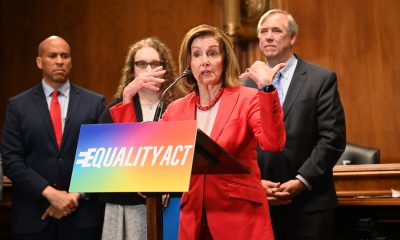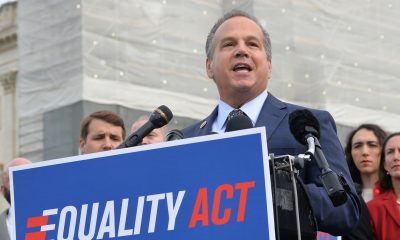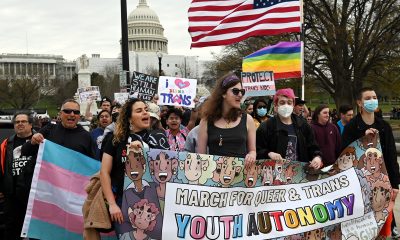National
A fourth openly gay member of Congress?
Democrat Cicilline faces Tuesday primary in R.I.

David Cicilline, the gay mayor of Providence, R.I., is seeking a U.S. House seat in this year’s election. (Photo courtesy of Cicilline Committee)
A gay Rhode Island politician running for Congress faces a major hurdle next week in his bid to represent the Ocean State in the U.S. House.
David Cicilline, the mayor of Providence, R.I., is facing a primary on Tuesday that will determine who will carry the Democratic banner in the general election to represent Rhode Island’s 1st congressional district and potentially succeed retiring Rep. Patrick Kennedy (D-R.I.) in Congress.
Should Cicilline win the primary and later the general election, he would become the fourth sitting openly gay member of Congress.
In a statement provided to the Blade, Cicilline said he’s “working hard every single day” to reach out to voters in the district he wants to represent.
“We are running a strong grassroots campaign with many volunteers knocking on doors, making phone calls and reaching out to voters more and more each day,” he said. “We are going to continue doing this from now until the election on Sept. 14.”
Cicilline is enjoying considerable support from the LGBT community in his bid for a U.S. House seat not only because he’s gay but also because he’s been supportive of the LGBT community in the past.
Kathy Kushnir, executive director of Marriage Equality Rhode Island, said Cicilline has been a steadfast supporter of same-sex marriage and other LGBT causes in his position as mayor and earlier as a state lawmaker.
“As mayor of the city of the Providence, he has always supported equal rights and he’s supported marriage equality and done everything that he can to make sure that all couples, all families are treated equally in the city of Providence,” she said. “We would love to see him do his good work wherever he goes.”
Among the national LGBT groups that have endorsed Cicilline are the Gay & Lesbian Victory Fund and Human Rights Campaign.
Robin Brand, deputy executive director of the Victory Fund, said Cicilline is “doing very well” as he approaches his primary.
“He’s working very hard; he’s raised a very competitive amount of money,” she said. “We are feeling that he’s in a very strong position going into Sept. 14.”
Cicilline’s main opponent in the primary is William Lynch, former head of the Rhode Island State Democratic Party. Other candidates in the running are Anthony Gemma, a businessman, and David Segal, a Rhode Island State House member.
Brand said primary results are sometimes hard to predict because turnout is often unpredictable, so Cicilline’s chances next week will depend on the ground game of getting out supporters.
“You’re also trying to message to a relatively small number of voters,” she said. “A lot of times, primary campaigns are really driven by endorsements and by personal connections to the community.”
But Cicilline has a number of factors in his favor as he enters the Democratic primary. A poll published last month by Brown University found the Providence mayor leading in the pack of Democratic candidates.
According to the poll, 32 percent said they would vote for Cicilline while 15 percent would support Lynch, 11 percent would support Gemma and 5 percent would support Segal.
Still, a number of votes could be up for grabs. In the poll, 35 percent of respondents identified as undecided.
Cicilline has also been a powerhouse fundraiser whose war chest dwarfs other Democratic opponents in the race.
According to the most recent Federal Election Commission reports, Cicilline has raised $1.16 million for his campaign and has more than $900,000 in cash on hand.
Comparatively, Lynch has raised $286,000, Gemma has raised $240,000 and Segal has raised $144,000.
Brand said both the poll and the fundraising numbers “absolutely” bode well for Cicilline as the primary approaches.
“You’d rather be ahead than behind, especially if we’re talking significant spread margins, which have been demonstrated not only in the fundraising, but also in the polling,” she said.
But Brand said the Cicilline campaign is “taking nothing for granted” despite these numbers and has “been building a strong field organization for months” in anticipation of the primary.
Still, Cicilline’s opponents are hammering on the problems facing Providence during his stewardship of the city as mayor, such as underperforming schools and high unemployment.
In a radio debate on Aug. 18, Gemma said Providence was in “shambles” and said Cicilline is not fit to serve in Congress, while Lynch said city schools are a “disaster,” according to the Associated Press.
Cicilline didn’t attend Wednesday’s debate reportedly because it was held during the “Buddy Cianci Show.” The show’s host, Cicilline’s predecessor as mayor, served time in federal prison for corruption.
In response to these criticisms, Brand said the situation in Rhode Island isn’t different from many other places that are facing economic problems.
“The frustration that voters are feeling about the state of the economy is happening across the country,” she said. “I think what voters are looking for is strong leaders, and David Cicilline is a strong leader.”
Brand said the Victory Fund hasn’t seen Cicilline’s Democratic challengers employ anti-gay campaign tactics in an attempt to derail the candidate in the primary.
Whoever wins the Democratic primary is likely to face in the general election GOP candidate John Loughlin, a Rhode Island Assembly member and Army veteran.
Even though the winner of the Sept. 14 primary would be running in a Democratic safe seat, Brand said Cicilline is “keeping a very close eye” on the general election.
“It is Patrick Kennedy’s seat and they kind of have hired the Scott Brown team to try and challenge him in the general, but I believe Mayor Cicilline performs strongly, which I expect he will, that’s going to position him well for holding that seat in November,” Brand said.
Besides the primary in Rhode Island, other openly LGBT candidates are facing elections on Tuesday and could achieve milestones with their wins.
In New York, two non-incumbent candidates are running for Democratic nominations to pursue seats in the State Assembly: Harry Bronson and Philip LaTessa, who are both small business owners.
Brand said the election of those candidates could have a bearing on the fight to win same-sex marriage in the Empire State.
“We’ve all been watching the marriage battle there very closely,” Brand said. “To increase the number of LGBT legislators able to work on that issue would be a huge advantage for us.”
In Massachusetts, lesbian Karen Payne, a former president of a local National Association for the Advancement of Colored People chapter, is running for a state House seat.
If she were to win in November, she would be among a handful of black lesbians who serve in state legislatures throughout the country. And in Maryland, a record 10 openly LGBT candidates are running for office. (See full story on page 4.)
New York
Two teens shot steps from Stonewall Inn after NYC Pride parade
One of the victims remains in critical condition

On Sunday night, following the annual NYC Pride March, two girls were shot in Sheridan Square, feet away from the historic Stonewall Inn.
According to an NYPD report, the two girls, aged 16 and 17, were shot around 10:15 p.m. as Pride festivities began to wind down. The 16-year-old was struck in the head and, according to police sources, is said to be in critical condition, while the 17-year-old was said to be in stable condition.
The Washington Blade confirmed with the NYPD the details from the police reports and learned no arrests had been made as of noon Monday.
The shooting took place in the Greenwich Village neighborhood of Manhattan, mere feet away from the most famous gay bar in the city — if not the world — the Stonewall Inn. Earlier that day, hundreds of thousands of people marched down Christopher Street to celebrate 55 years of LGBTQ people standing up for their rights.
In June 1969, after police raided the Stonewall Inn, members of the LGBTQ community pushed back, sparking what became known as the Stonewall riots. Over the course of two days, LGBTQ New Yorkers protested the discriminatory policing of queer spaces across the city and mobilized to speak out — and throw bottles if need be — at officers attempting to suppress their existence.
The following year, LGBTQ people returned to the Stonewall Inn and marched through the same streets where queer New Yorkers had been arrested, marking the first “Gay Pride March” in history and declaring that LGBTQ people were not going anywhere.
New York State Assemblywoman Deborah Glick, whose district includes Greenwich Village, took to social media to comment on the shooting.
“After decades of peaceful Pride celebrations — this year gun fire and two people shot near the Stonewall Inn is a reminder that gun violence is everywhere,” the lesbian lawmaker said on X. “Guns are a problem despite the NRA BS.”
New York
Zohran Mamdani participates in NYC Pride parade
Mayoral candidate has detailed LGBTQ rights platform

Zohran Mamdani, the candidate for mayor of New York City who pulled a surprise victory in the primary contest last week, walked in the city’s Pride parade on Sunday.
The Democratic Socialist and New York State Assembly member published photos on social media with New York Attorney General Letitia James, telling followers it was “a joy to march in NYC Pride with the people’s champ” and to “see so many friends on this gorgeous day.”
“Happy Pride NYC,” he wrote, adding a rainbow emoji.
Mamdani’s platform includes a detailed plan for LGBTQ people who “across the United States are facing an increasingly hostile political environment.”
His campaign website explains: “New York City must be a refuge for LGBTQIA+ people, but private institutions in our own city have already started capitulating to Trump’s assault on trans rights.
“Meanwhile, the cost of living crisis confronting working class people across the city hits the LGBTQIA+ community particularly hard, with higher rates of unemployment and homelessness than the rest of the city.”
“The Mamdani administration will protect LGBTQIA+ New Yorkers by expanding and protecting gender-affirming care citywide, making NYC an LGBTQIA+ sanctuary city, and creating the Office of LGBTQIA+ Affairs.”
U.S. Supreme Court
Supreme Court upholds ACA rule that makes PrEP, other preventative care free
Liberal justices joined three conservatives in majority opinion

The U.S. Supreme Court on Friday upheld a portion of the Affordable Care Act requiring private health insurers to cover the cost of preventative care including PrEP, which significantly reduces the risk of transmitting HIV.
Conservative Justice Brett Kavanaugh authored the majority opinion in the case, Kennedy v. Braidwood Management. He was joined by two conservatives, Chief Justice John Roberts and Justice Amy Coney Barrett, along with the three liberal justices, Sonia Sotomayor, Elena Kagan, and Ketanji Brown-Jackson.
The court’s decision rejected the plaintiffs’ challenge to the Affordable Care Act’s reliance on the U.S. Preventative Services Task Force to “unilaterally” determine which types of care and services must be covered by payors without cost-sharing.
An independent all-volunteer panel of nationally recognized experts in prevention and primary care, the 16 task force members are selected by the secretary of the U.S. Department of Health and Human Services to serve four-year terms.
They are responsible for evaluating the efficacy of counseling, screenings for diseases like cancer and diabetes, and preventative medicines — like Truvada for PrEP, drugs to reduce heart disease and strokes, and eye ointment for newborns to prevent infections.
Parties bringing the challenge objected especially to the mandatory coverage of PrEP, with some arguing the drugs would “encourage and facilitate homosexual behavior” against their religious beliefs.
-

 U.S. Supreme Court3 days ago
U.S. Supreme Court3 days agoSupreme Court upholds ACA rule that makes PrEP, other preventative care free
-

 U.S. Supreme Court3 days ago
U.S. Supreme Court3 days agoSupreme Court rules parents must have option to opt children out of LGBTQ-specific lessons
-

 National5 days ago
National5 days agoEvan Wolfson on the 10-year legacy of marriage equality
-

 Congress4 days ago
Congress4 days agoSenate parliamentarian orders removal of gender-affirming care ban from GOP reconciliation bill












